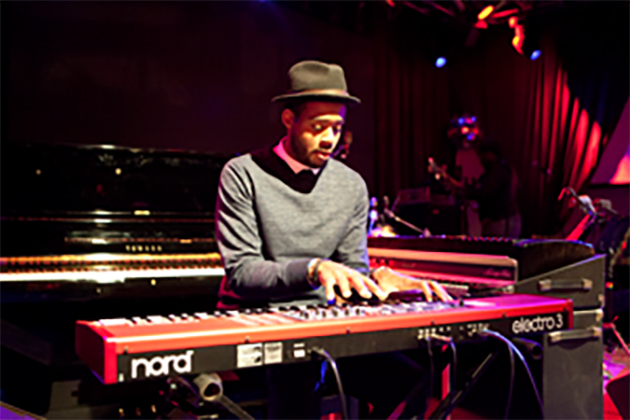“Driven,” “innovative,” and “pundit” are a mere three words to describe the Los Angeles born and Julliard-trained Kris Bowers. Recently nominated for a Daytime Emmy for Amazon’s TV movie The Snowy Day, he also composed Norman Lear: Just Another Version of You, which premiered at the opening night of the Sundance Film Festival, and Little Boxes which premiered at the TriBeCa Film Festival and was promptly purchased by Netflix.
His versatility has led to his work on many other scores including Netflix’s new hit series Dear White People.
Today, Mr. Bowers speaks candidly with me about his career highs and lows, in addition to his recipe for longevity.
Ashly Smith: Greetings Mr. Bowers! It’s a pleasure to meet you! How are you feeling today?
Kris Bowers: I’m doing great! Thanks for asking.
No problem! The son of a film and television writer, and television executive, you have star quality in your blood. Yet instead of an actor, you became a musician. Were your parents instrumental in this, or did you discover your own gifts?
My parents actually decided before I was born that they’d like me to play the piano. I’m not sure what inspired this, but they even put headphones on my mom’s stomach to play recordings of piano music they’d found from time to time. But, I’ve known since I was pretty young that I’d like to be a film composer.
Wow! If you weren’t a musician what would you be your chosen career path?
Something visual. Either an animator or in branding. I wanted to be a cartoonist until about sophomore year of high school. That’s when I decided to stick to and focus on music. Still, I’m a very visual person and love designing things like logos, proposal decks, posters, etc.

What is your greatest strength?
My ability to pivot or adapt very quickly when needed, without fear and/or ego.
I like that! What is your greatest weakness?
Being a perfectionist.
In a nutshell, Kris Bowers is?
Trying to figure it all out.
Now, that’s what I call honesty! What’s the one thing that people always misunderstand about you?
Many people mistake my kindness for weakness or timidity. I’m actually a pretty aggressive and competitive person, but I keep it pretty well contained.
I can certainly relate! Do you consider yourself an introvert or an extrovert?
More of an ambivert. I’m naturally more inclined to keep to myself, but I’m also very comfortable being an extrovert if the situation calls for it.
Interesting word choice! I understand too! Have you ever pushed the boundaries of your comfort zone?
I try to pretty frequently. I feel most comfortable when I’m learning something new or feel like I’m out of my league. One of the main things I love about being a film composer is being challenged to write different genres/approaches to music on a consistent basis.
If so, when was the last time that you did?
I’ve recently been doing a lot more in the songwriting space. While I feel very confident in my skills as a musician and composer, having to help craft lyrics with incredibly experienced songwriters has been a steep learning curve. I also already have a few projects on the horizon that will surely challenge the boundaries of my comfort zone.
I can tell by the different genres that you have explored throughout your work, that you are eclectic, as proven with some of your biggest influences being Oscar Peterson, Wynton Kelly, Duke Ellington, Ahmad Jamal, and Count Basie Who are some of your other favorites?
The artists you mentioned are some of my favorite jazz pianists, among a long list of others, but my overall musical inspiration has been pretty varied lately. That list would include Steve Reich, Cliff Martinez, Brian Eno, Trent Reznor, My Bloody Valentine, Kendrick Lamar, John Williams, Bernard Herrmann, and a long list of others.
Nice! What is your dream collaboration?
Right now, either Kendrick Lamar or Bon Iver.
Cool! Do you see any elements of yourself in these artists?
I’m sure they’re inspired by a very similar list of artists as I am. They also seem to be propelled to and feel comfortable making music that challenges the norm.
Your title Heroes and Misfits stems from the shift that was happening within your generation at that time. Can you elaborate on that?

I was writing the album around the height of Arab Spring, and the beginning of the Black Lives Matter movement, and it had been the first time I saw my generation come together in that way. We’d been known for our complacency and apathy towards social issues, but that was the beginning of massive calls to action. At the time, I was also doing research on the naming of generations and stumbled upon the generational theories of William Strauss and Neil Howe. According to them, ours would be the “Hero” generation because of certain economic, social, and political cycles. That all seemed to align in a very profound way with what was happening at the time.
In your own personal story, do you consider yourself the hero or the misfit?
I think they’re one in the same. Throughout history, the heroes were always the outliers. A misfit is only seen as such when they refuse to conform.
You have obtained a both bachelor’s and master’s degree in jazz performance from Julliard which has trained some o ft he brightest and best. Three of my other favorites performers have also graduated from there, such as Samira Wiley, Danielle Brooks, and Corey Hawkins. Have you ever crossed paths with them navigating through the halls?
I love those guys! I remember all of them very well and still keep in touch. It’s actually been very special lately to see them in the real world. I just saw Samira and Danielle at a Netflix event the other day and we were all incredibly happy to see each other. Seeing the success of them, Corey, or any other Juilliard grads I saw in the hallways (Jon Batiste, Jahaan Sweet, Jeremie Harris, Finn Wittrock, are a few others) feels like a win for me.
You have many impeccable pieces, but one of my favorites is your cover of Kendrick Lamar’s Rigamortis. What made you cover that one among others?
I’ve been a fan of Kendrick for a really long time, but that was actually the track that introduced me to his work. Even more interestingly, the sample in that track is a song written by my piano teacher Eric Reed.
In one paragraph, describe your creative process. What gets you in the mood to create?
It depends on the context. With a film, it’s the story that is the catalyst for my approach. More often than not, the scene will dictate pretty clearly what it needs. But even outside of the context of film music, I need some sort of story to pull inspiration from. That story could come from a book, a real-world event or even piece of visual art.
As a guy who has worked on many popular films scores such as the 2013 films Seeds of Time and Elaine Stritch: Shoot Me starring Alec Baldwin and Tina Fey. You have also worked on Kobe Bryant’s Muse starring Kobe Bryant, I Am Giant: Victor Cruz, and one of my favorites, the Netflix series Dear White People. Tell us how these have molded you into a better musician?
Having to find different ways to translate emotion into music, I’ve gotten a lot better at evoking a feeling when I write, and that’s the most powerful thing about music.
Tell us about your experience working on Dear White People.
It’s not only incredible to be a part of a show that is talking about important issues in such a brilliant way, but they gave me so much trust and autonomy with composing for the show that I felt empowered to do my thing with it. I would write some pretty adventurous pieces for the show, and they wouldn’t have anything to say about it! That never happens.
There were a lot of pivotal moments on the show where faith, loyalty, and reputations were tested to prove major points. If you were in this situation, would you choose to risk your reputation by standing up for what is right in front of your peers? Or would you think it was best to do nothing?
Definitely the former. I’ve always put speaking up for what’s right and what I believe in far before my reputation or what people think about me.
Both personally and professionally, do you consider yourself open-minded?
Most definitely. I love trying new things and being led to new experiences by others
It has been said that being too open-minded in all avenues sometimes causes destructive thinking within society. Do you agree or disagree?
I disagree. It’s being closed minded and afraid of new things that stunt the growth and development of society.
What’s the one thing you would like to change about yourself?
I’d like to be less critical of myself. I wonder what I would discover if I didn’t judge myself so quickly in the creative process.
I dig that! What has been your biggest accomplishment so far?
I’d say performing at The White House for President Barack and First Lady Michelle Obama for the International Jazz Day concert in 2016. That felt pretty special.
That’s amazing! What is your biggest regret so far?
I don’t have any regrets. Without every choice and experience in my life, I wouldn’t be who or where I am today. And I’m completely satisfied with that.
Great answer! If your life was a movie, what would the title be?
Great question but impossible to answer. I think every day of my life is like a completely different movie.
What’s your philosophy in life?
Devote all of your energy into your passion or craft, and try to be a good person.
Love it! What’s next for you? Are you currently working on your next project?
At the moment I’m working with Kobe Bryant of some of his projects as he begins delving into the film and TV industry, and I’m also working on remaking the Ray Charles album, Modern Sounds in Country and Western Music with the fashion designer Mark McNairy and a number of special guests.
—
You can follow Kris Bowers on Twitter or check him out on Facebook.






